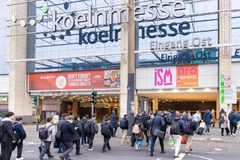Nestlé Nigeria achieves 50% recycled PET inclusion in water packaging
Key takeaways
- Nestlé Nigeria becomes the first company in the country to achieve 50% rPET inclusion in its water packaging.
- Through partnerships with FBRA, Chanja Datti, Wecyclers, and others, Nestlé has diverted over 61,000 metric tons of plastic waste from landfills.
- The company promotes circular economy practices through employee recycling schemes and industry collaboration.

Nestlé Nigeria has become the first company in the country to incorporate 50% recycled PET (rPET) into its water packaging.
Nestlé is a founding member of the Food and Beverage Recycling Alliance (FBRA), Nigeria’s first producer responsibility organization. FBRA was established to advance EPR and ensure that producers and importers of packaged goods take active responsibility for the post-consumer stage of their packaging materials.
“Today, some of the plastics recovered are rechanneled into Nestlé Nigeria’s 50% rPET inclusion project for its water brands — a first-of-its-kind achievement in Nigeria. The inclusion represents the highest permissible standard under current regulatory guidelines,” says the company.
“This milestone underscores Nestlé’s leadership in advancing circular packaging solutions, setting a benchmark for the industry while inspiring broader adoption of sustainable practices.”

“Beyond reducing dependence on virgin plastics, the initiative contributes meaningfully to the national circular economy agenda, where waste is transformed into value and innovation supports environmental resilience.”
Advancing circularity
As part of FBRA, Nestlé works on community-based recycling and circular packaging innovation.
Nestlé Nigeria has facilitated the diversion of over 61,000 metric tons of plastic waste from landfills through its partnerships with FBRA, recyclers, and local social enterprises, including Chanja Datti, Wecyclers, and Maladase Ecopreneur Management.
One of its key initiatives, the Plastic Advantage Programme, empowers 43 mini-aggregators through training, equipment support, and access to off-take markets. This approach aims to strengthen local recycling systems and enable inclusive economic participation for waste entrepreneurs.
“Complementing these efforts is the Nestlé Employee Plastics Collection Scheme, which encourages employees to bring their recyclables to the office for recycling. The initiative drives sustainable behaviour change and allows employees to actively support Nestlé’s vision of a waste-free future. It reflects the company’s belief that true circularity starts from within,” says Nestlé Nigeria.
“The path forward demands continued multi-stakeholder engagement, stronger enforcement of EPR regulations, and scalable innovations that make recycling accessible to every household.”
This summer, Nestlé joined forces with IBM Research for AI-based processing techniques to create environmentally sustainable barrier packaging materials.











